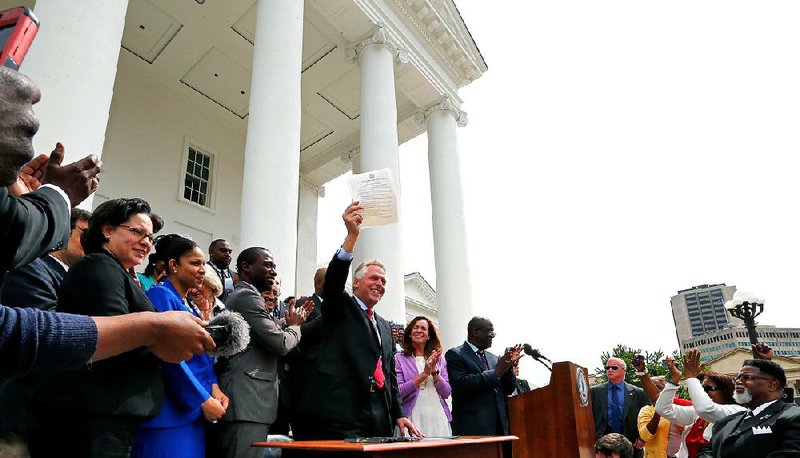WASHINGTON -- Gov. Terry McAuliffe of Virginia used his executive power Friday to restore voting rights to more than 200,000 convicted felons, circumventing the Republican-run Legislature.
The action overturns a Civil War-era provision in the state's constitution aimed, he said, at disenfranchising black people.
"This is the essence of our democracy and any effort to dilute that fundamental principle diminishes it, folks, for all of us," McAuliffe said on the steps of Virginia's Capitol, before a crowd of more than 100 people that included many felons. Advocacy groups were there as well, handing out voter registration forms.
The order will enable all felons who have served their prison time and finished parole or probation to register to vote. Most are blacks, a core constituency of Democrats, McAuliffe's political party.
"There's no question that we've had a horrible history in voting rights as relates to African-Americans -- we should remedy it," McAuliffe said in an interview Thursday, previewing the announcement Friday. "We should do it as soon as we possibly can."
The action, which McAuliffe said was justified under an expansive legal interpretation of his executive clemency authority, provoked an immediate backlash from Virginia Republicans.
They issued a statement Friday accusing the governor of "political opportunism" and "a transparent effort to win votes."
"Those who have paid their debts to society should be allowed full participation in society," said the statement from the party chairman, John Whitbeck. "But there are limits." He said McAuliffe was wrong to issue a blanket restoration of rights, even to those who "committed heinous acts of violence."
Kimberly Carter, 45, filled out a voter registration card shortly after watching the governor's speech. Now working as a customer service representative, she said she's been prevented from voting her entire adult life after a drug arrest in her late teens.
"You make a mistake, 20 years later you're still paying for it," she said.
Advocates who have been working with the Virginia governor say they are planning to fan out into Richmond communities Friday afternoon to start registering people.
There is no way to know how many of the newly eligible voters in Virginia will register.
In the interview, McAuliffe said he was not acting for political reasons and that few people outside his immediate staff had known of his plans. He said he had not consulted with Democratic presidential candidate Hillary Clinton or her campaign before making the decision.
The executive order builds on steps the governor had already taken to restore voting rights to 18,000 Virginians since the beginning of his term, and he said he believed that his authority to issue the decision was "ironclad."
Virginia's constitution has prohibited felons from voting since the Civil War; the restrictions were expanded in 1902, as part of a package that included poll taxes and literacy tests.
McAuliffe, who took office in 2014 and campaigned to restore voting rights to felons, said that he viewed disenfranchisement as "a remnant of the poll tax" and that he had been "trying to figure out what more I can possibly do."
The governor's action Friday will not apply to felons released in the future; his aides say McAuliffe intends to issue similar orders on a monthly basis to cover people as they are released.
"People have served their time and done their probation," McAuliffe said. "I want you back in society. I want you feeling good about yourself. I want you voting, getting a job, paying taxes."
Nationwide, nearly 6 million Americans are barred from voting because of laws disenfranchising felons, according to the Washington-based Sentencing Project.
Governors and legislatures across the nation have been debating the restoration of voting rights for convicted felons. Over the past two decades about 20 states have acted to ease their restrictions, according to the Brennan Center for Justice at New York University.
Before Friday, Virginia had been one of four states -- the others being Florida, Iowa and Kentucky -- to remove voting rights for felons for life unless a state official restores them.
In Kentucky, Gov. Matt Bevin, a newly elected Republican, recently overturned an order enacted by his Democratic predecessor that was similar to the one McAuliffe signed Friday.
As in Kentucky, previous governors in Florida and Iowa took executive action to ease the states' lifetime bans, but in each case, a subsequent governor restored the rules.
In Maryland, Gov. Larry Hogan, a Republican, vetoed a measure to restore voting rights to convicted felons, but Democrats in the state Legislature overrode him in February and an estimated 44,000 former prisoners who are on probation are now eligible to register for voting.
Under the Arkansas Constitution, a person convicted of a felony loses the right to vote. However, a felon can take steps to regain his ability to vote. For example, he has to prove that he has been discharged from probation or parole or satisfied all terms of imprisonment, and paid all fees, fines, restitution or court costs as required.
Only two states -- Maine and Vermont -- have no voting restrictions on felons.
Information for this article was contributed by Sheryl Gay Stolberg and Erik Eckholm of The New York Times and by Alan Suderman and Alanna Durkin Richer of The Associated Press.
A Section on 04/23/2016

